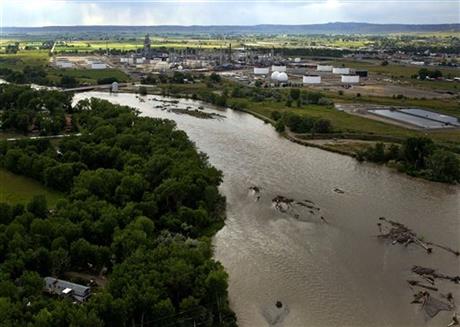
By MATTHEW BROWN
RETRANSMISSION TO CORRECT NAME OF REFINERY – FILE – In this July,10, 2011 file photo, oil-fouled islands and a sheen on the water are seen downstream of an Exxon Mobil crude pipeline that broke beneath the Yellowstone River near a CHS, Inc. refinery, background, in Laurel, Mont. Montana and federal officials say they will seek compensation from Exxon Mobil Corp. for natural resource damages caused by a crude oil spill into the Yellowstone River. A Thursday Oct. 31, 2013 announcement comes two years after an Exxon pipeline near Laurel broke during flooding and released 63,000 gallons of oil. More than 70 miles of riverbank were contaminated. (AP Photo/Julie Jacobson, File)
BILLINGS, Mont. (AP) — After two years of review, Montana and federal officials notified Exxon Mobil Corp. on Thursday that they intend to seek damages for injuries to birds, fish and other natural resources from a major crude oil spill into the Yellowstone River.
The Texas company’s 12-inch Silvertip pipeline broke near Laurel during flooding in July 2011, releasing 63,000 gallons of oil that washed up along an 85-mile stretch of the scenic river.
The move puts Exxon on notice that Montana and the Department of Interior expect the company to make up for harm done to wildlife and their habitat. The company also is being asked to pay for long-term environmental studies and for lost opportunities for fishing and recreation during and since the cleanup.
Separate fines totaling $3.4 million for safety and water pollution violations already have been resolved or are pending before state and federal agencies.
Exxon has told regulators it spent $135 million on the cleanup and related repair work intended to prevent a repeat of the spill, which came on a line installed just a few feet beneath the riverbed.
State officials said some of the damage is ongoing and will take years to fully understand and quantify.
That includes harm done to the river and its banks during the cleanup itself, when Exxon brought in 1,000 workers who removed hundreds of oil-stained wood piles along the river.
“You picked up the oil, but you picked up the stuff that makes the habitat work, as well,” said Bob Gibson, a spokesman for Montana Fish, Wildlife and Parks. “We know there’s damage out there that has not been mitigated, cleaned up or compensated for. We need to decide what further can be done.”
An Exxon spokeswoman said the company is working to reach an amicable settlement, but she declined to say whether the company intends to contest any damages sought by government officials.
“ExxonMobil Pipeline Company regrets that the Silvertip Pipeline incident occurred and has worked cooperatively with the federal and state natural resource trustees in investigating the nature and extent of potential injuries to natural resources as a result of the spill,” spokeswoman Amber Gardner wrote in an emailed statement.
The pipeline accident spurred Congress to demand a Department of Transportation review of oil and other hazardous liquid pipelines that cross beneath major rivers and other waterways across the U.S. The agency last year said there were more than 2,800 such locations.
The Transportation Department recently revised its estimate to 18,136 hazardous pipeline crossings, including 5,110 locations where the body of water has a width of 100 feet or greater.
Federal officials have said they will return to Congress in early 2014 with a determination on whether rules such as a 4-foot depth requirement for pipeline crossings are sufficient.
The Yellowstone spill also prompted oil companies including Exxon to rebury pipelines at other water crossings where the lines were considered at risk of failure due to erosion. In the case of Silvertip, the company installed new sections of line dozens of feet beneath the surface at the Laurel site and two other crossings.
Negotiations with Exxon are ongoing but no agreement has been reached, said Robert Collins, the state’s lead attorney in the case.
If the company resists paying for the upcoming studies or for compensation, Collins said the state and federal government could take legal action. It’s uncertain how long it will take to gauge the extent of damages. For other spills the process has taken many years.
“We’re anticipating we could go to court, but we want to give (negotiations) a try before we take that step because that would string things out even further,” Collins said.



